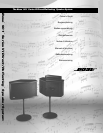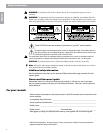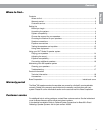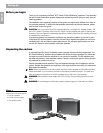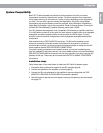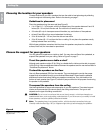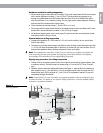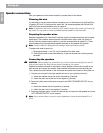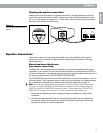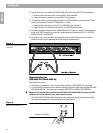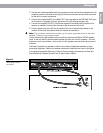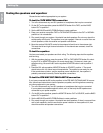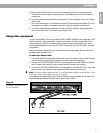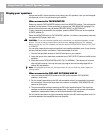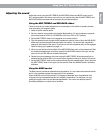
5
English
Setting Up
System Compatibility
Bose
®
901
®
Series VI speakers and Series VI active equalizer work with your stereo
components to produce a superb music system. The active equalizer is an integral part
of the system and may be connected in a variety of ways, depending on the components
you have. The two most common methods are described in this guide. Using different
components may require different connection methods. More information is available by
calling Bose Corporation. Ask for the free booklet, Guide to Optional System Connections
for Bose 901 Direct/Reflecting
®
Speaker Systems, part number 149393.
Your 901 speakers are designed to work compatibly with receivers or amplifiers rated from
10 to 450 watts per channel. In this guide, the term receiver is used to refer to an integrated
preamplifier and power amplifier (which may also contain an AM/FM tuner). The term
amplifier is used to describe configurations involving separate preamplifier and amplifier
components.
Most receivers have a TAPE MONITOR connection. The 901 active equalizer is most
commonly connected to the tape monitor connections on the receiver. If you plan to
connect a tape recorder, use the set of inputs and outputs located on the back of the 901
active equalizer marked TAPE RECORDER CONNECTIONS.
If you have recently purchased a home theater receiver, you may be considering using
your 901 speakers for the front channels. Your home theater receiver must have accessible
PRE AMP OUT/MAIN AMP IN connections for the front channels if you are to use your 901
speakers in this way. These may also be called the ADAPTER or SIGNAL PROCESSOR
connections.
Installation steps
Follow these steps, in the order below, to install your 901 Series VI speaker system.
1. Choose the best locations and support for the 901 speakers (page 6).
2. Connect the speakers to the amplifier or receiver (page 8).
3. Connect the 901 active equalizer to the amplifier or receiver using either the TAPE
MONITOR or PRE AMP OUT/MAIN AMP IN connections (page 9).
4. Test the system to see that the audio signal is correctly processed by the active equal-
izer (page 12).




